Medical Errors: Analyzing Challenges, Solutions, Ethical Implications
VerifiedAdded on 2022/10/17
|6
|1651
|21
Report
AI Summary
This report delves into the critical issue of medical errors within the healthcare sector, presenting a comprehensive analysis of the problem. It begins by highlighting the significance of medical errors as a major cause of death and increased healthcare costs, citing relevant statistics and studies. The report explores various types of medical errors, including medication errors, diagnostic delays, and infections, and identifies the primary causes such as communication breakdowns, human errors, and system failures. It then proposes potential solutions, emphasizing the importance of a safety-oriented culture, open disclosure of errors, and ethical responsibilities of healthcare professionals. The report stresses the need for healthcare organizations to implement measures that promote patient safety, reduce costs, and improve the overall quality of care. Ethical implications are discussed, particularly the dilemma of reporting errors and the importance of accountability. The report concludes by advocating for the adoption of ethical guidelines and comprehensive strategies to prevent medical errors and enhance patient outcomes. This report is based on the student's research and analysis of the provided assignment brief.
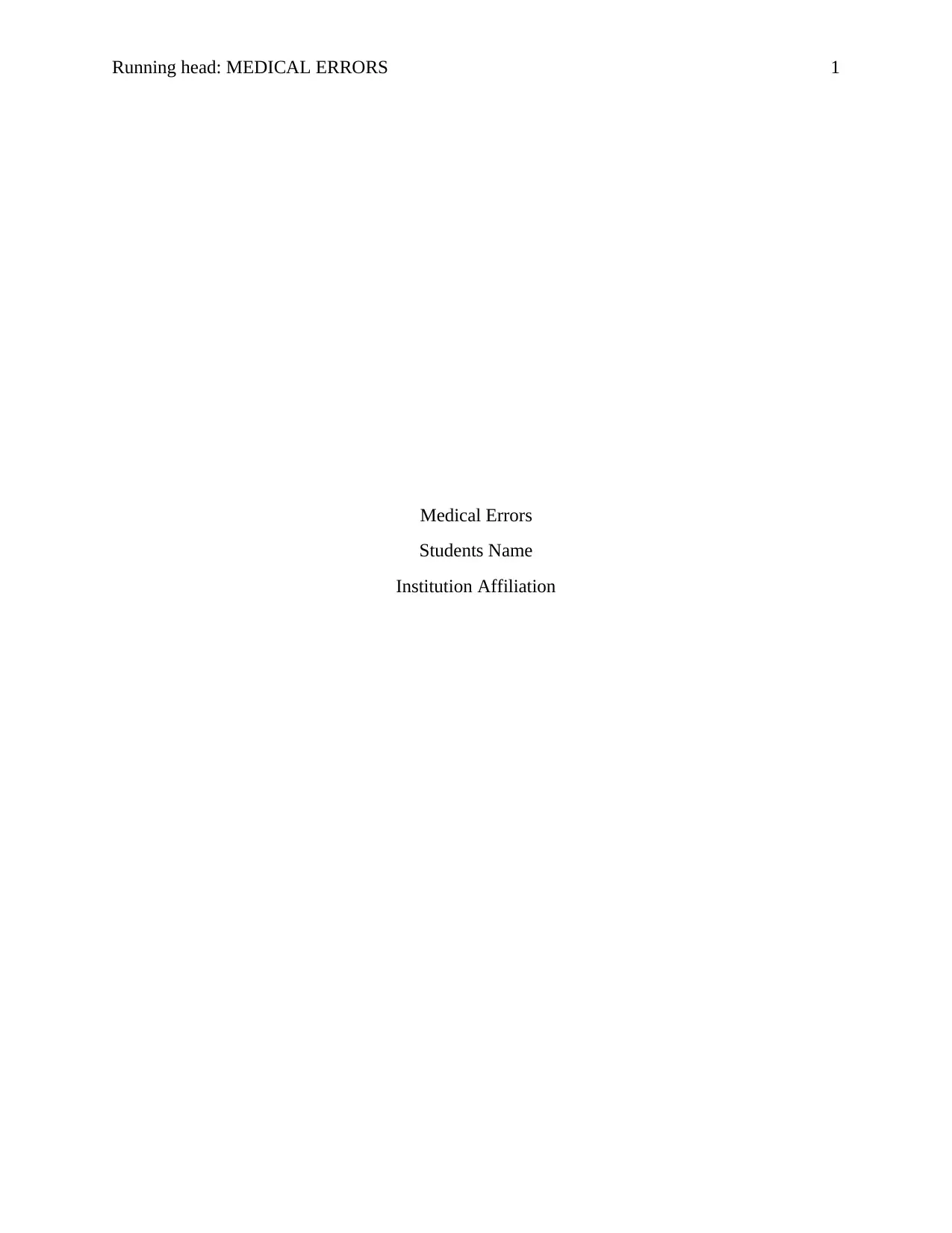
Running head: MEDICAL ERRORS 1
Medical Errors
Students Name
Institution Affiliation
Medical Errors
Students Name
Institution Affiliation
Paraphrase This Document
Need a fresh take? Get an instant paraphrase of this document with our AI Paraphraser
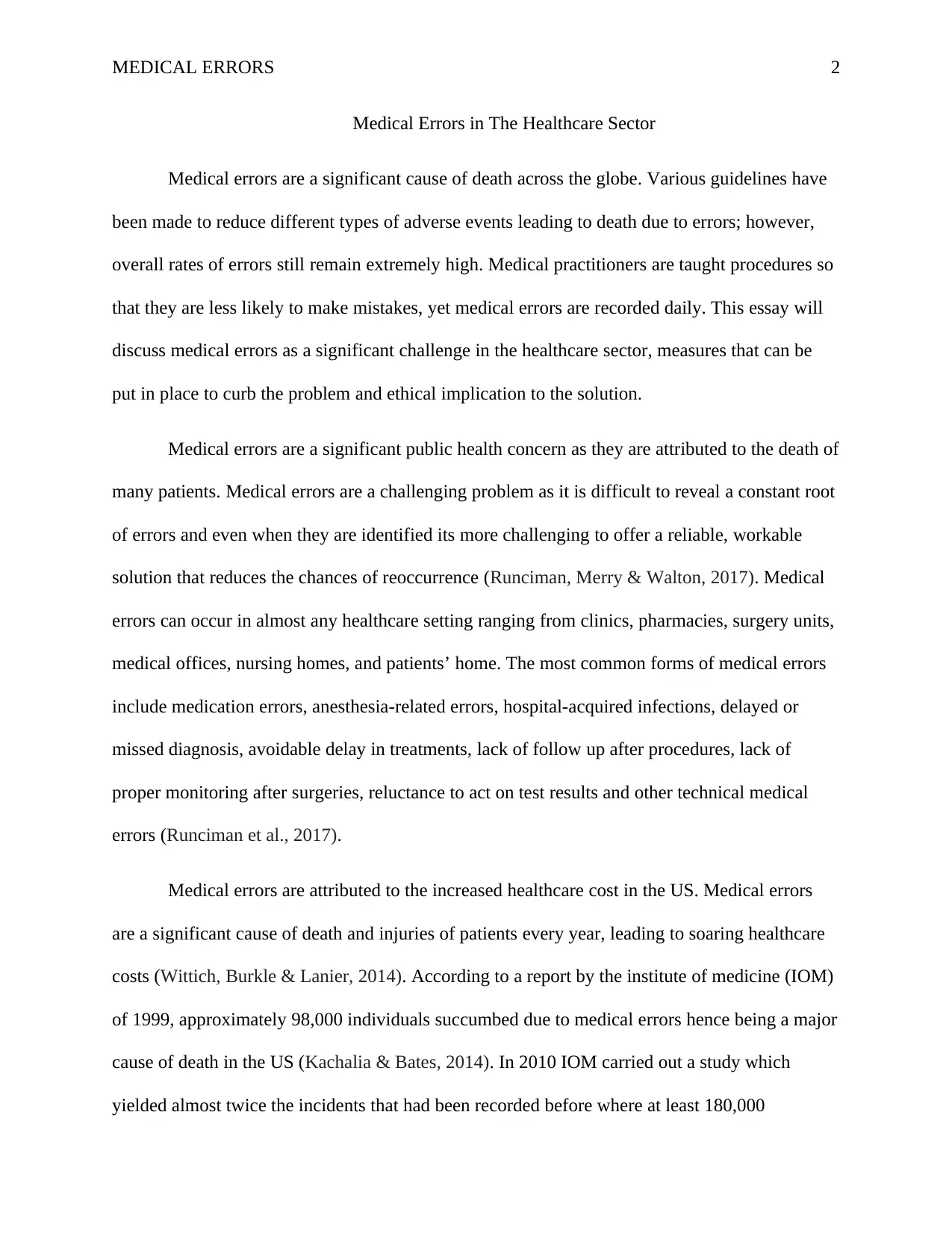
MEDICAL ERRORS 2
Medical Errors in The Healthcare Sector
Medical errors are a significant cause of death across the globe. Various guidelines have
been made to reduce different types of adverse events leading to death due to errors; however,
overall rates of errors still remain extremely high. Medical practitioners are taught procedures so
that they are less likely to make mistakes, yet medical errors are recorded daily. This essay will
discuss medical errors as a significant challenge in the healthcare sector, measures that can be
put in place to curb the problem and ethical implication to the solution.
Medical errors are a significant public health concern as they are attributed to the death of
many patients. Medical errors are a challenging problem as it is difficult to reveal a constant root
of errors and even when they are identified its more challenging to offer a reliable, workable
solution that reduces the chances of reoccurrence (Runciman, Merry & Walton, 2017). Medical
errors can occur in almost any healthcare setting ranging from clinics, pharmacies, surgery units,
medical offices, nursing homes, and patients’ home. The most common forms of medical errors
include medication errors, anesthesia-related errors, hospital-acquired infections, delayed or
missed diagnosis, avoidable delay in treatments, lack of follow up after procedures, lack of
proper monitoring after surgeries, reluctance to act on test results and other technical medical
errors (Runciman et al., 2017).
Medical errors are attributed to the increased healthcare cost in the US. Medical errors
are a significant cause of death and injuries of patients every year, leading to soaring healthcare
costs (Wittich, Burkle & Lanier, 2014). According to a report by the institute of medicine (IOM)
of 1999, approximately 98,000 individuals succumbed due to medical errors hence being a major
cause of death in the US (Kachalia & Bates, 2014). In 2010 IOM carried out a study which
yielded almost twice the incidents that had been recorded before where at least 180,000
Medical Errors in The Healthcare Sector
Medical errors are a significant cause of death across the globe. Various guidelines have
been made to reduce different types of adverse events leading to death due to errors; however,
overall rates of errors still remain extremely high. Medical practitioners are taught procedures so
that they are less likely to make mistakes, yet medical errors are recorded daily. This essay will
discuss medical errors as a significant challenge in the healthcare sector, measures that can be
put in place to curb the problem and ethical implication to the solution.
Medical errors are a significant public health concern as they are attributed to the death of
many patients. Medical errors are a challenging problem as it is difficult to reveal a constant root
of errors and even when they are identified its more challenging to offer a reliable, workable
solution that reduces the chances of reoccurrence (Runciman, Merry & Walton, 2017). Medical
errors can occur in almost any healthcare setting ranging from clinics, pharmacies, surgery units,
medical offices, nursing homes, and patients’ home. The most common forms of medical errors
include medication errors, anesthesia-related errors, hospital-acquired infections, delayed or
missed diagnosis, avoidable delay in treatments, lack of follow up after procedures, lack of
proper monitoring after surgeries, reluctance to act on test results and other technical medical
errors (Runciman et al., 2017).
Medical errors are attributed to the increased healthcare cost in the US. Medical errors
are a significant cause of death and injuries of patients every year, leading to soaring healthcare
costs (Wittich, Burkle & Lanier, 2014). According to a report by the institute of medicine (IOM)
of 1999, approximately 98,000 individuals succumbed due to medical errors hence being a major
cause of death in the US (Kachalia & Bates, 2014). In 2010 IOM carried out a study which
yielded almost twice the incidents that had been recorded before where at least 180,000
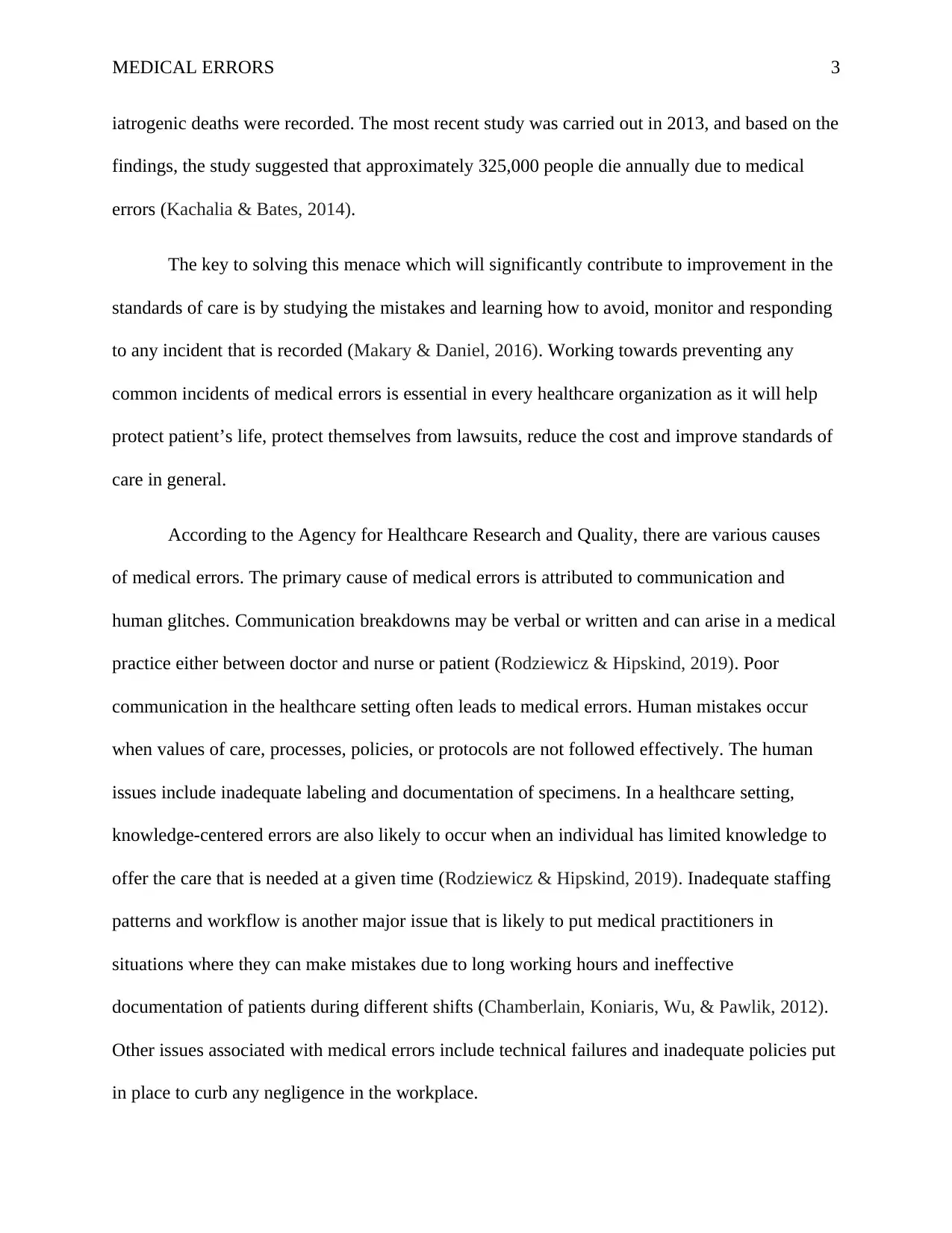
MEDICAL ERRORS 3
iatrogenic deaths were recorded. The most recent study was carried out in 2013, and based on the
findings, the study suggested that approximately 325,000 people die annually due to medical
errors (Kachalia & Bates, 2014).
The key to solving this menace which will significantly contribute to improvement in the
standards of care is by studying the mistakes and learning how to avoid, monitor and responding
to any incident that is recorded (Makary & Daniel, 2016). Working towards preventing any
common incidents of medical errors is essential in every healthcare organization as it will help
protect patient’s life, protect themselves from lawsuits, reduce the cost and improve standards of
care in general.
According to the Agency for Healthcare Research and Quality, there are various causes
of medical errors. The primary cause of medical errors is attributed to communication and
human glitches. Communication breakdowns may be verbal or written and can arise in a medical
practice either between doctor and nurse or patient (Rodziewicz & Hipskind, 2019). Poor
communication in the healthcare setting often leads to medical errors. Human mistakes occur
when values of care, processes, policies, or protocols are not followed effectively. The human
issues include inadequate labeling and documentation of specimens. In a healthcare setting,
knowledge-centered errors are also likely to occur when an individual has limited knowledge to
offer the care that is needed at a given time (Rodziewicz & Hipskind, 2019). Inadequate staffing
patterns and workflow is another major issue that is likely to put medical practitioners in
situations where they can make mistakes due to long working hours and ineffective
documentation of patients during different shifts (Chamberlain, Koniaris, Wu, & Pawlik, 2012).
Other issues associated with medical errors include technical failures and inadequate policies put
in place to curb any negligence in the workplace.
iatrogenic deaths were recorded. The most recent study was carried out in 2013, and based on the
findings, the study suggested that approximately 325,000 people die annually due to medical
errors (Kachalia & Bates, 2014).
The key to solving this menace which will significantly contribute to improvement in the
standards of care is by studying the mistakes and learning how to avoid, monitor and responding
to any incident that is recorded (Makary & Daniel, 2016). Working towards preventing any
common incidents of medical errors is essential in every healthcare organization as it will help
protect patient’s life, protect themselves from lawsuits, reduce the cost and improve standards of
care in general.
According to the Agency for Healthcare Research and Quality, there are various causes
of medical errors. The primary cause of medical errors is attributed to communication and
human glitches. Communication breakdowns may be verbal or written and can arise in a medical
practice either between doctor and nurse or patient (Rodziewicz & Hipskind, 2019). Poor
communication in the healthcare setting often leads to medical errors. Human mistakes occur
when values of care, processes, policies, or protocols are not followed effectively. The human
issues include inadequate labeling and documentation of specimens. In a healthcare setting,
knowledge-centered errors are also likely to occur when an individual has limited knowledge to
offer the care that is needed at a given time (Rodziewicz & Hipskind, 2019). Inadequate staffing
patterns and workflow is another major issue that is likely to put medical practitioners in
situations where they can make mistakes due to long working hours and ineffective
documentation of patients during different shifts (Chamberlain, Koniaris, Wu, & Pawlik, 2012).
Other issues associated with medical errors include technical failures and inadequate policies put
in place to curb any negligence in the workplace.
⊘ This is a preview!⊘
Do you want full access?
Subscribe today to unlock all pages.

Trusted by 1+ million students worldwide
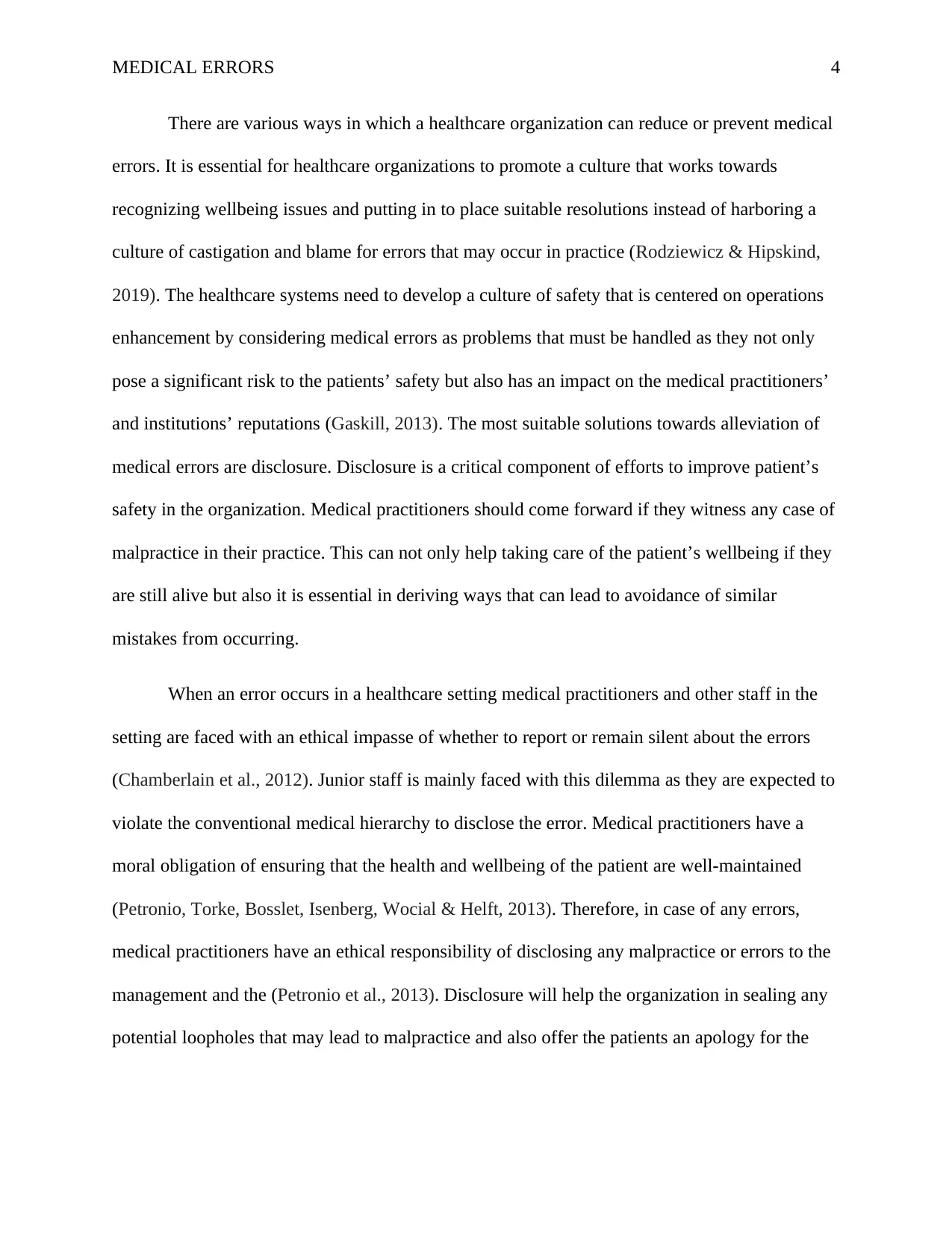
MEDICAL ERRORS 4
There are various ways in which a healthcare organization can reduce or prevent medical
errors. It is essential for healthcare organizations to promote a culture that works towards
recognizing wellbeing issues and putting in to place suitable resolutions instead of harboring a
culture of castigation and blame for errors that may occur in practice (Rodziewicz & Hipskind,
2019). The healthcare systems need to develop a culture of safety that is centered on operations
enhancement by considering medical errors as problems that must be handled as they not only
pose a significant risk to the patients’ safety but also has an impact on the medical practitioners’
and institutions’ reputations (Gaskill, 2013). The most suitable solutions towards alleviation of
medical errors are disclosure. Disclosure is a critical component of efforts to improve patient’s
safety in the organization. Medical practitioners should come forward if they witness any case of
malpractice in their practice. This can not only help taking care of the patient’s wellbeing if they
are still alive but also it is essential in deriving ways that can lead to avoidance of similar
mistakes from occurring.
When an error occurs in a healthcare setting medical practitioners and other staff in the
setting are faced with an ethical impasse of whether to report or remain silent about the errors
(Chamberlain et al., 2012). Junior staff is mainly faced with this dilemma as they are expected to
violate the conventional medical hierarchy to disclose the error. Medical practitioners have a
moral obligation of ensuring that the health and wellbeing of the patient are well-maintained
(Petronio, Torke, Bosslet, Isenberg, Wocial & Helft, 2013). Therefore, in case of any errors,
medical practitioners have an ethical responsibility of disclosing any malpractice or errors to the
management and the (Petronio et al., 2013). Disclosure will help the organization in sealing any
potential loopholes that may lead to malpractice and also offer the patients an apology for the
There are various ways in which a healthcare organization can reduce or prevent medical
errors. It is essential for healthcare organizations to promote a culture that works towards
recognizing wellbeing issues and putting in to place suitable resolutions instead of harboring a
culture of castigation and blame for errors that may occur in practice (Rodziewicz & Hipskind,
2019). The healthcare systems need to develop a culture of safety that is centered on operations
enhancement by considering medical errors as problems that must be handled as they not only
pose a significant risk to the patients’ safety but also has an impact on the medical practitioners’
and institutions’ reputations (Gaskill, 2013). The most suitable solutions towards alleviation of
medical errors are disclosure. Disclosure is a critical component of efforts to improve patient’s
safety in the organization. Medical practitioners should come forward if they witness any case of
malpractice in their practice. This can not only help taking care of the patient’s wellbeing if they
are still alive but also it is essential in deriving ways that can lead to avoidance of similar
mistakes from occurring.
When an error occurs in a healthcare setting medical practitioners and other staff in the
setting are faced with an ethical impasse of whether to report or remain silent about the errors
(Chamberlain et al., 2012). Junior staff is mainly faced with this dilemma as they are expected to
violate the conventional medical hierarchy to disclose the error. Medical practitioners have a
moral obligation of ensuring that the health and wellbeing of the patient are well-maintained
(Petronio, Torke, Bosslet, Isenberg, Wocial & Helft, 2013). Therefore, in case of any errors,
medical practitioners have an ethical responsibility of disclosing any malpractice or errors to the
management and the (Petronio et al., 2013). Disclosure will help the organization in sealing any
potential loopholes that may lead to malpractice and also offer the patients an apology for the
Paraphrase This Document
Need a fresh take? Get an instant paraphrase of this document with our AI Paraphraser
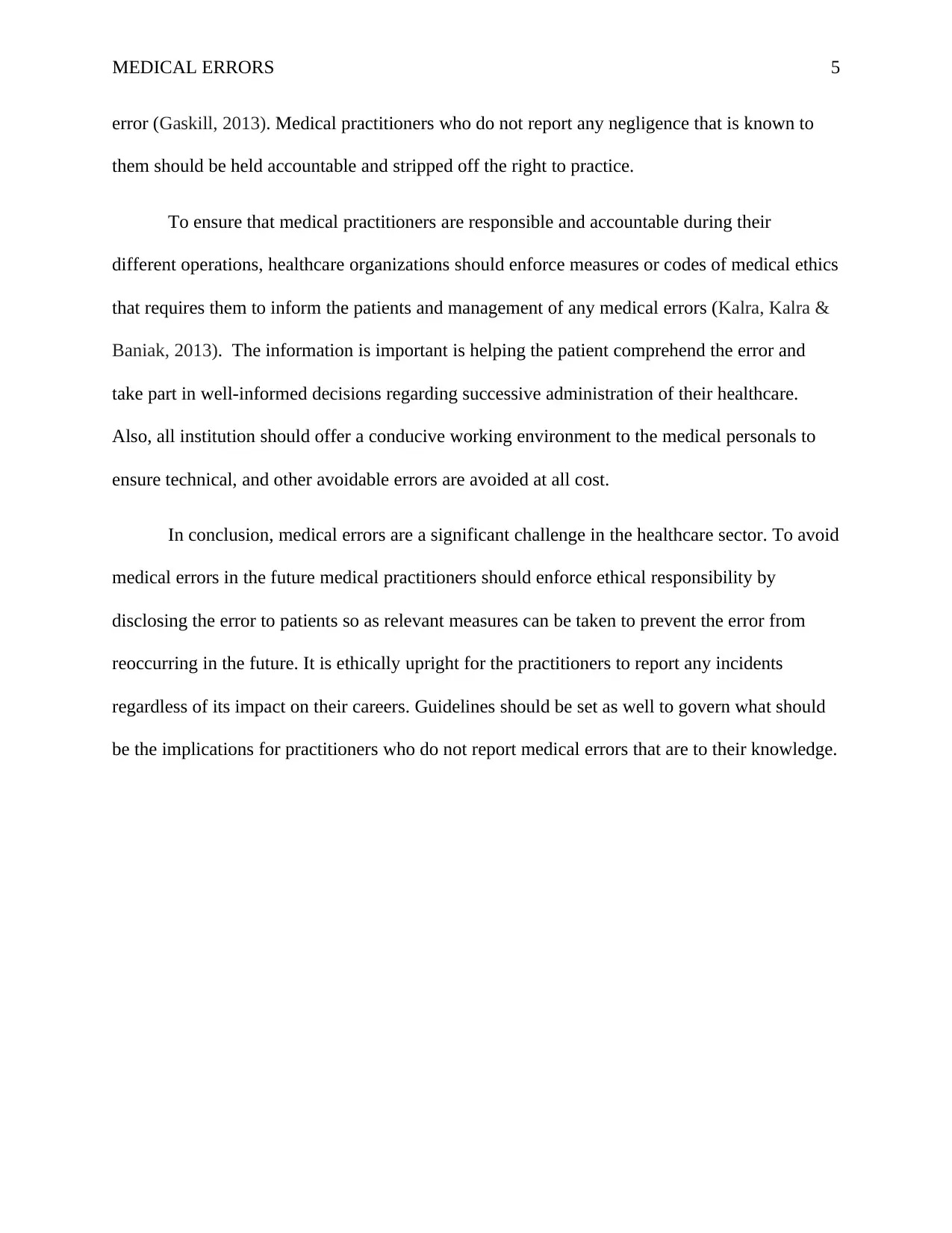
MEDICAL ERRORS 5
error (Gaskill, 2013). Medical practitioners who do not report any negligence that is known to
them should be held accountable and stripped off the right to practice.
To ensure that medical practitioners are responsible and accountable during their
different operations, healthcare organizations should enforce measures or codes of medical ethics
that requires them to inform the patients and management of any medical errors (Kalra, Kalra &
Baniak, 2013). The information is important is helping the patient comprehend the error and
take part in well-informed decisions regarding successive administration of their healthcare.
Also, all institution should offer a conducive working environment to the medical personals to
ensure technical, and other avoidable errors are avoided at all cost.
In conclusion, medical errors are a significant challenge in the healthcare sector. To avoid
medical errors in the future medical practitioners should enforce ethical responsibility by
disclosing the error to patients so as relevant measures can be taken to prevent the error from
reoccurring in the future. It is ethically upright for the practitioners to report any incidents
regardless of its impact on their careers. Guidelines should be set as well to govern what should
be the implications for practitioners who do not report medical errors that are to their knowledge.
error (Gaskill, 2013). Medical practitioners who do not report any negligence that is known to
them should be held accountable and stripped off the right to practice.
To ensure that medical practitioners are responsible and accountable during their
different operations, healthcare organizations should enforce measures or codes of medical ethics
that requires them to inform the patients and management of any medical errors (Kalra, Kalra &
Baniak, 2013). The information is important is helping the patient comprehend the error and
take part in well-informed decisions regarding successive administration of their healthcare.
Also, all institution should offer a conducive working environment to the medical personals to
ensure technical, and other avoidable errors are avoided at all cost.
In conclusion, medical errors are a significant challenge in the healthcare sector. To avoid
medical errors in the future medical practitioners should enforce ethical responsibility by
disclosing the error to patients so as relevant measures can be taken to prevent the error from
reoccurring in the future. It is ethically upright for the practitioners to report any incidents
regardless of its impact on their careers. Guidelines should be set as well to govern what should
be the implications for practitioners who do not report medical errors that are to their knowledge.
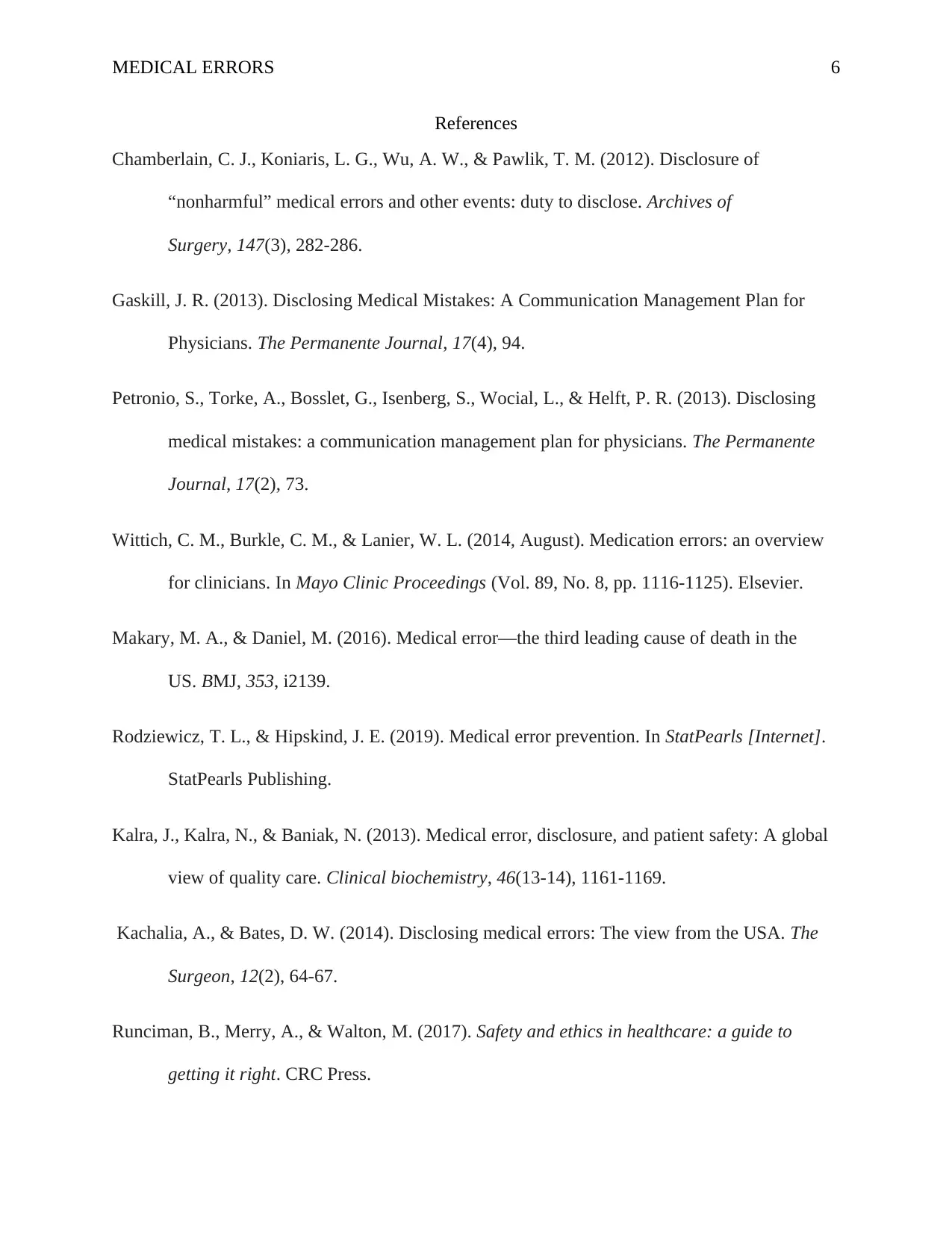
MEDICAL ERRORS 6
References
Chamberlain, C. J., Koniaris, L. G., Wu, A. W., & Pawlik, T. M. (2012). Disclosure of
“nonharmful” medical errors and other events: duty to disclose. Archives of
Surgery, 147(3), 282-286.
Gaskill, J. R. (2013). Disclosing Medical Mistakes: A Communication Management Plan for
Physicians. The Permanente Journal, 17(4), 94.
Petronio, S., Torke, A., Bosslet, G., Isenberg, S., Wocial, L., & Helft, P. R. (2013). Disclosing
medical mistakes: a communication management plan for physicians. The Permanente
Journal, 17(2), 73.
Wittich, C. M., Burkle, C. M., & Lanier, W. L. (2014, August). Medication errors: an overview
for clinicians. In Mayo Clinic Proceedings (Vol. 89, No. 8, pp. 1116-1125). Elsevier.
Makary, M. A., & Daniel, M. (2016). Medical error—the third leading cause of death in the
US. BMJ, 353, i2139.
Rodziewicz, T. L., & Hipskind, J. E. (2019). Medical error prevention. In StatPearls [Internet].
StatPearls Publishing.
Kalra, J., Kalra, N., & Baniak, N. (2013). Medical error, disclosure, and patient safety: A global
view of quality care. Clinical biochemistry, 46(13-14), 1161-1169.
Kachalia, A., & Bates, D. W. (2014). Disclosing medical errors: The view from the USA. The
Surgeon, 12(2), 64-67.
Runciman, B., Merry, A., & Walton, M. (2017). Safety and ethics in healthcare: a guide to
getting it right. CRC Press.
References
Chamberlain, C. J., Koniaris, L. G., Wu, A. W., & Pawlik, T. M. (2012). Disclosure of
“nonharmful” medical errors and other events: duty to disclose. Archives of
Surgery, 147(3), 282-286.
Gaskill, J. R. (2013). Disclosing Medical Mistakes: A Communication Management Plan for
Physicians. The Permanente Journal, 17(4), 94.
Petronio, S., Torke, A., Bosslet, G., Isenberg, S., Wocial, L., & Helft, P. R. (2013). Disclosing
medical mistakes: a communication management plan for physicians. The Permanente
Journal, 17(2), 73.
Wittich, C. M., Burkle, C. M., & Lanier, W. L. (2014, August). Medication errors: an overview
for clinicians. In Mayo Clinic Proceedings (Vol. 89, No. 8, pp. 1116-1125). Elsevier.
Makary, M. A., & Daniel, M. (2016). Medical error—the third leading cause of death in the
US. BMJ, 353, i2139.
Rodziewicz, T. L., & Hipskind, J. E. (2019). Medical error prevention. In StatPearls [Internet].
StatPearls Publishing.
Kalra, J., Kalra, N., & Baniak, N. (2013). Medical error, disclosure, and patient safety: A global
view of quality care. Clinical biochemistry, 46(13-14), 1161-1169.
Kachalia, A., & Bates, D. W. (2014). Disclosing medical errors: The view from the USA. The
Surgeon, 12(2), 64-67.
Runciman, B., Merry, A., & Walton, M. (2017). Safety and ethics in healthcare: a guide to
getting it right. CRC Press.
⊘ This is a preview!⊘
Do you want full access?
Subscribe today to unlock all pages.

Trusted by 1+ million students worldwide
1 out of 6
Related Documents
Your All-in-One AI-Powered Toolkit for Academic Success.
+13062052269
info@desklib.com
Available 24*7 on WhatsApp / Email
![[object Object]](/_next/static/media/star-bottom.7253800d.svg)
Unlock your academic potential
Copyright © 2020–2026 A2Z Services. All Rights Reserved. Developed and managed by ZUCOL.




